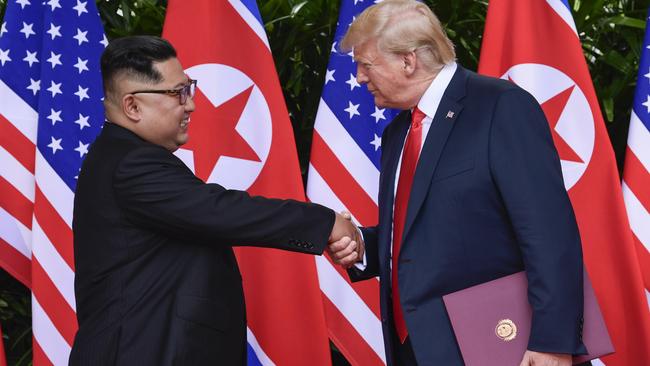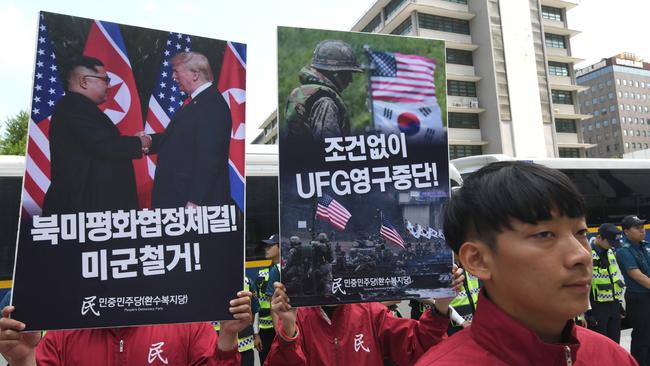Allies crudely betrayed in Trump’s cosying up to Kim
Donald Trump’s actions could lead to dire consequences in our region.

This is actually the most important question to emerge from his summit with the North Korean dictator, Kim Jong-un, in Singapore this week. For Australia, it is perhaps a question of ultimately existential importance.
It is modestly likely there will be some progress, some action, in reducing some element of the North Korean nuclear program. It is almost certain there will not be anything like complete, verifiable, irreversible nuclear disarmament in North Korea. Every decent person hopes that will occur but there are almost no grounds for thinking it likely.
Too much analysis of this episode is caught up in the Trump culture wars and ideological combat. Overall, Trump has been a better president than I thought he would be. His decision to boost US defence is immensely important. His general critique of trade processes has a good deal of substance, though he applies more pressure to allies than adversaries. His tax cuts have boosted the US economy, as has his deregulation. His actions on Israel are sensible and help the cause of peace because they force the actors to deal with reality.
People who think everything Trump does is wrong ignore the facts. Those who think everything he does is right are equally unreal.
The most dangerous elements of Trump’s foreign policy are his contemptuous and counter-productive disregard for US alliances, his exaggerated need to personalise every issue around whether he is flattered, and his general inability to follow though anything with consistency.
Another failure is his tendency to reverse himself. His supporters think this shrewd negotiation. In reality it cheapens the President’s word and eats away at US credibility. These qualities offer acute vulnerabilities for shrewder international actors to exploit.
It is barely possible that Kim Jong-un has decided to get rid of his nuclear weapons but there is no evidence for this.
The first comprehensive North Korean government-signed commitment to implement complete denuclearisation of the Korean peninsula that I was professionally aware of, so to speak, was signed in 1992.
This was when Kim’s grandfather, Kim Il-sung, was dictator. His son, Kim Jong-il, also committed to this lofty goal. Everything that has been claimed as unique for Singapore has been done many times before, except the personal presence of the US president.
But there have certainly been high-profile public events. Madeleine Albright, Bill Clinton’s secretary of state, visited Pyongyang in 2000 and won a solemn promise from Kim Jong-il never to develop ballistic missiles.
North Korea often conducted verifiable actions regarding denuclearisation. In 2007 it decommissioned its nuclear reactor at Yongbyon. The next year it blew up the cooling tower. You can’t get much more verifiable than that.
At the same time it was racing ahead with a clandestine program to use enriched uranium to build its nukes.
The 1992 declaration was signed the same month I became foreign editor of the Australian. In the subsequent 26 years I have been peripherally involved in what seem countless iterations of the “North Korea is liberalising and denuclearising” story. There was a group of North Korean officials who visited Sydney spruiking the liberalism of the North’s special investment zone. More than once I visited the Dorasan railway station near the North-South border which was meant to usher in a new era of trade. Once, in South Korea to interview the president, I was invited to join the daily busload of tourists that then went from South to North for supervised day trips.
A couple of weeks later the North Koreans took the day’s tourists hostage and kept them for a few weeks, which brought the modest tourist trade to an end.
The point of this little historical recitation is that the pattern is clear. All three generations of the Kim dynasty occasionally make public concessions, and engage in supportive gestures, to relieve international pressure and get foreign money. But they emerge in due course having never given up their weapons or programs. Trump has promised South Korean and Japanese finance for the North’s new denuclearisation.
To believe it might be different this time we need to see some evidence. Instead, this joint declaration is even woollier and less specific than the previous ones.
Similarly, the marvellously elastic phrase “work towards the complete denuclearisation of the Korean peninsula” is interpreted very distinctively by Kim. There are no nukes in South Korea. Kim may well believe that denuclearisation means the US withdrawing its nuclear umbrella over South Korea. This nuclear umbrella is extended nuclear deterrence.
Australia also enjoys extended nuclear deterrence provided by the US. It means that if a US ally is attacked with nuclear weapons the US will respond decisively. Extended nuclear deterrence is one of the most important counter-proliferation mechanisms in human history because it means US allies do not need their own nuclear weapons.
Like most things in international security, and everything in Asia, it depends absolutely on US credibility, especially the credibility of alliances.
Here is where Trump’s mist-treatment of key US allies South Korea and Japan in Singapore is so shocking and dangerous.
Trump should never have decided to suspend US-South Korea military exercises, which he inaccurately and pejoratively mislabelled as “war games”. Nor should he have adopted North Korean and Chinese terminology, describing them as “provocative”. To do both without even privately consulting South Korea and Japan is an almost unimaginable insult of allies.
The world was facing the imminent prospect of nuclear war only because Trump had threatened as much (“fire and fury”). Obviously he had to move away from those threats given they were frightening and unrealistic. And he is right to explore to the fullest extent any opening by North Korea. But he didn’t need to trash the US alliance structure to do so.
Perhaps the ugliest element of Trump’s public persona is his love of strongmen dictators — Xi Jinping, Vladimir Putin and now Kim. Xi and Putin he truly admires and never misses an opportunity to flatter them.
This results in a debilitating incoherence in the Trump administration. Under congressional pressure, and in line with the advice of the great agencies of state, he imposes tough sanctions on Russia, but then calls for Putin to be readmitted to the G7.
The Trump administration’s National Security Strategy identifies China as the strategic rival to the US and condemns its behaviour in the South China Sea, in cyber espionage and in a host of other fields. Yet at Singapore, Trump declares it’s fine that China has already relaxed the enforcement of sanctions against North Korea.
This is not nimble negotiating, this is incoherence, but it is an incoherence that is starting to undermine the credibility of US alliance commitments.
Most analysts think Kim would have gone along with Trump’s Singapore charade without this extra and ridiculous concession from Trump over military exercises. It is not the US and South Korea that are breaking international law.
There is no reason for them to apologise and if such apologies are necessary to Kim then obviously he is not serious about his own new commitments. These aren’t real or don’t represent Kim’s view of his own interests if such a concession as this is necessary even to get him to show up to a summit he has always wanted and sign a meaningless document.
Probably Trump really had Xi Jinping in mind when he made this concession. His faux smart international negotiating makes him think that by trading away key elements of the alliance with South Korea he can get more of what he wants from Xi.
But the US-South Korea alliance is critical to Asian security generally. That is why Beijing has worked so hard to damage it. And it has had some success. It has intimidated Seoul into not deploying any more missile defence systems, though these offer an outside chance of intercepting a North Korean nuke.

For months, Beijing has been arguing the US and North Korea should have “twin freezes”. North Korea freezes nuclear and missile tests while the US and South Korea freeze military exercises. The US has always rejected this. Its 30,000 troops in South Korea are not postured to invade anybody but they greatly enhance South Korean defence readiness. North Korea has already conducted as many nuclear tests as India, which has a full nuclear arsenal. North Korea doesn’t need any more nuclear tests.
Very much like Barack Obama, Trump has given away something precious to get absolutely nothing in return. He has planted in the mind of every US ally a deep question mark. Would Trump sell out an ally’s interests merely to get a glorified photo-op and a chance to lavish praise on himself at a press conference? That would be vintage Obama.
No American knows North Asia better than Mike Green, who was the senior Asia director on George W. Bush’s National Security Council and now holds professorial appointments at Georgetown University and at the Centre for Strategic and International Studies. Green did not support Trump in the Republican primaries but is not reflexively anti-Trump. He praised Trump’s national security strategy in an interview with me recently.
He told me this week that Trump’s Singapore performance was “one of the worst episodes of throwing allies under the bus in the postwar period”.
“The real story is what this says about Donald Trump’s attitude to US alliances and ongoing American commitments. He plainly doesn’t understand why we have alliances and what they mean.”
The serious erosion of the US alliance system in Asia could have many consequences.
One might be nuclear proliferation, as Japan and even South Korea, and perhaps others, may find the only way to provide for their security is through their own nuclear weapons.
Or it could lead to complete Chinese regional hegemony.
Either of these outcomes would be disastrous for Australia. Hurting the US alliance structure in Asia hurts Australia’s national security. That is what Trump did more than anything in Singapore this week.




Has Donald Trump significantly damaged the structure of US alliances which are the crucial guarantor of Asian security, and indeed of Australian security?